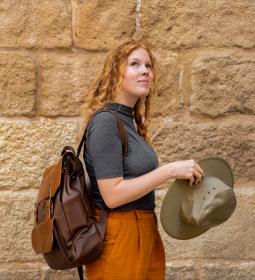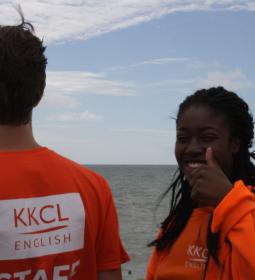What are you doing today if you want to start learning English or improve your existing skills? Looking for a tutor? Online courses? A native speaker willing to learn language for Skype conversations and peer learning? Summer camp with language immersion? Phone app? How to Learn English from Movies / Books / Songs? The variety of options is amazing!
But how did they learn a foreign language before, when the world was not so permeable in terms of information, few foreigners were allowed into the Soviet Union, and the citizens of the country were not allowed to study abroad?
Parents of today's schoolchildren, 35-40-year-olds remember what it is like to accurately find the right track on the disc in order to listen to the text for listening for the 20th time, stories about Samantha Smith for reading and translation in textbooks, handwritten dictionaries in a thick notebook with three columns : word in English, transcription, translation.
Let's find out how English was taught - no, not dinosaurs, but those who went to school 30 years ago?

Studied from textbooks

The textbooks were more traditional: texts and dialogues for reading, framed rules, words in bold for memorization, and writing exercises. Today's sets with a textbook and workbook in A4 format with game exercises and illustrations are not very similar to standard format (84 * 108) hardback books with a moderate amount of illustrations.
List of English textbooks for schoolchildren of the Soviet period:
- "Textbook of the English language for seven-year and high school" 1951, published by Yu.I. Godlinnik, M.D. Blacksmith.
- "Grammar of the English language for secondary school" I.A. Georgian, 1951
- "Textbook of the English language" E.V. Belova. R.L. Todd, 1957
- "Textbook of English for high school", written by I.A. Nelidova. R.L. Todd, 1968
- "Textbook of the English language", 1969, G.M. Weiser, S.K. Folomkina. E.I. Kaar.
- "English", 1981, A.P. Starkova, R.R. Dixon, M.D. Rybakov.
- "Textbook of the English language", 1969, G.M. Weiser, S.K. Folomkina, E.I. Kaara.
- "English", A.P. Starkova, R.R. Dixon, M.D. Rybakov, 1981
Listened to records

4 whales of learning a foreign language: listening, reading, writing and speaking. So, Soviet children listened to vinyl records with recordings of dialogues, poems, texts and songs in English. They were listened to on turntables, later they were copied from records to audio cassettes and listened to on tape recorders.
The most popular sets of audio recordings for practicing listening skills:
- Starkov. Ostrovsky. Sound supplement to the educational complex in English for the 9th grade of secondary schools, 1987
- H. Andrews. Say it with us. Teaching English from records on records. Wiedza Powszechna, Warsaw, 1966
Later, educational programs began to appear with Big Muzzy - an English educational cartoon that seemed to be a cosmic achievement in the field of English teaching. Gradually, borders were opened, new textbooks were published, teachers went on internships abroad, mastered new methods. The world became more diverse, it became more interesting to study, but not easier. Mastering a second language is still a difficult task that requires dedication, perseverance, and patience.










